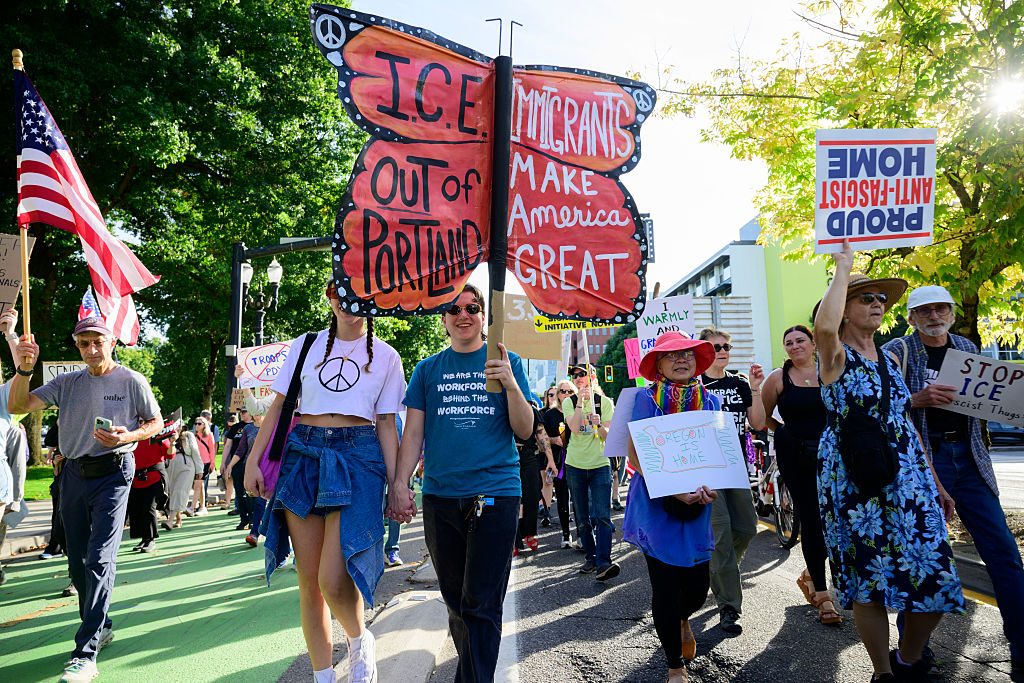Donald Trump’s latest pledge to send the National Guard into Portland feels less like a response to a crisis and more like an unwanted sequel. The original deployment occurred in the summer of 2020, amid months of protests and recurring clashes near courthouses and police stations, some of which turned violent. The city saw a deadly incident that August when Michael Reinoehl, a self-proclaimed anti-fascist, shot and killed Aaron “Jay” Danielson, a member of the far-Right group Patriot Prayer. Reinoehl was subsequently killed by a US Marshals task force.
This time, the backdrop is far quieter: protests over ICE raids in 2025 are real but a fraction of the intensity of the George Floyd era. Plus, there are signs that Portland, like other blue cities, has quietly begun its own course correction.
Much has changed since the Obama years, when Portland was immortalised in the satirical TV show Portlandia as a place where overeducated hipsters went to ride bikes, sip craft beer, and debate backyard chicken ordinances. For decades, the Rose City was a darling of American urban policy, but that reputation collapsed after the killing of George Floyd in Minneapolis and the summer of riots which followed. Then, voters and city leaders responded to the subsequent unrest with maximalist gestures of progressive libertarianism. The police were defunded by $15 million, drugs were decriminalised, and the rhetoric of a new, gentler civic order briefly carried the day.
Instead, it met the hard edge of reality. The longstanding problem of unsheltered homelessness escalated into a full-blown crisis, intensified by drug decriminalisation just as fentanyl surged across the country. Crime increased, fentanyl overdoses mounted, and civic disorder became an everyday reality. The pandemic hurt downtown real estate, sending office vacancy rates over 30%, the highest of any city in the United States. The city’s self-image as a model of 21st-century urban progress became a national punchline, and Portland became shorthand for liberal governance gone wrong.
Yet the story is not simply one of decay. Portland, like other deep-blue cities on the West Coast, such as San Francisco and Seattle, has quietly walked back the most radical parts of its agenda since the early part of the decade. The city restored police funding, recriminalised drugs, and today, violent crime is falling.
In the first six months of 2025, Portland recorded 17 homicides, and its homicide rate dropped by 51% compared to the same period last year, according to preliminary figures from the Major Cities Chiefs Association. In comparison, Memphis — a city Trump also plans to send the National Guard to — has registered 145 murder victims in the first eight months of the year. Despite its continued problems with homelessness and empty commercial space, Portland is no longer in the midst of a crime wave.
That’s not to say the National Guard deployments during Trump’s second term have been all bad. In DC, troops have recently been deployed on small-scale civic projects: clearing trash, spreading mulch, painting fences, and even offering to help run a soup kitchen. It’s proof that cities like Portland don’t need soldiers; they need something closer to a modern Conservation Corps, a programme that could put young people to work rebuilding parks, schools, and infrastructure, while restoring the civic trust that withered during the pandemic years.
There’s an irony in Trump’s heavy-handed deployment of federal troops for community clean-up and beautification. If Democrats had been the ones proposing to spend hundreds of millions on federal workers to do the same jobs — clearing trash, painting fences, serving in soup kitchens — Republicans would decry it as big government run amok. However, when workers wear fatigues and are dispatched by Trump, the very same effort is celebrated. It is, in its own way, a sequel to 2020 — only this time to play out a kind of Portlandia skit, where soldiers do the civic chores once left to bearded progressives with clipboards and community grants.
